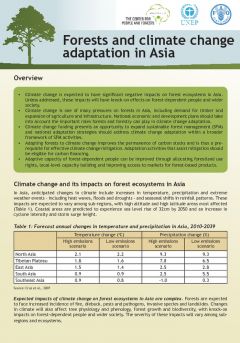Forests and Climate Change Adaption in Asia
Resource information
Date of publication
December 2011
Resource Language
ISBN / Resource ID
recoftc:48
Copyright details
Copyright © RECOFTC January 2012
This brief, produced jointly by FAO, UNEP and RECOFTC, outlines the ways in which forests contribute to climate change adaptation in the Asian region. It details current climate changes impacting forest ecosystems in Asia; key components of climate change adaptation and sustainable forest management; the current status of climate change adaptation and forests in Asia; and the way ahead.
Overview:
- Climate change is expected to have significant negative impacts on forest ecosystems in Asia. Unless addressed, these impacts will have knock-on effects on forest-dependent people and wider society.
- Climate change is one of many pressures on forests in Asia, including demand for timber and expansion of agriculture and infrastructure. National economic and development plans should take into account the important roles forests and forestry can play in climate change adaptation.
- Climate change funding presents an opportunity to expand sustainable forest management (SFM) and national adaptation strategies should address climate change adaptation within a broader framework of SFM activities.
- Adapting forests to climate change improves the permanence of carbon stocks and is thus a prerequisite for effective climate change mitigation. Adaptation activities that assist mitigation should be eligible for carbon financing.
- Adaptive capacity of forest-dependent people can be improved through allocating forestland use rights, local-level capacity building and improving access to markets for forest-based products.
Data Provider
Geographical focus




